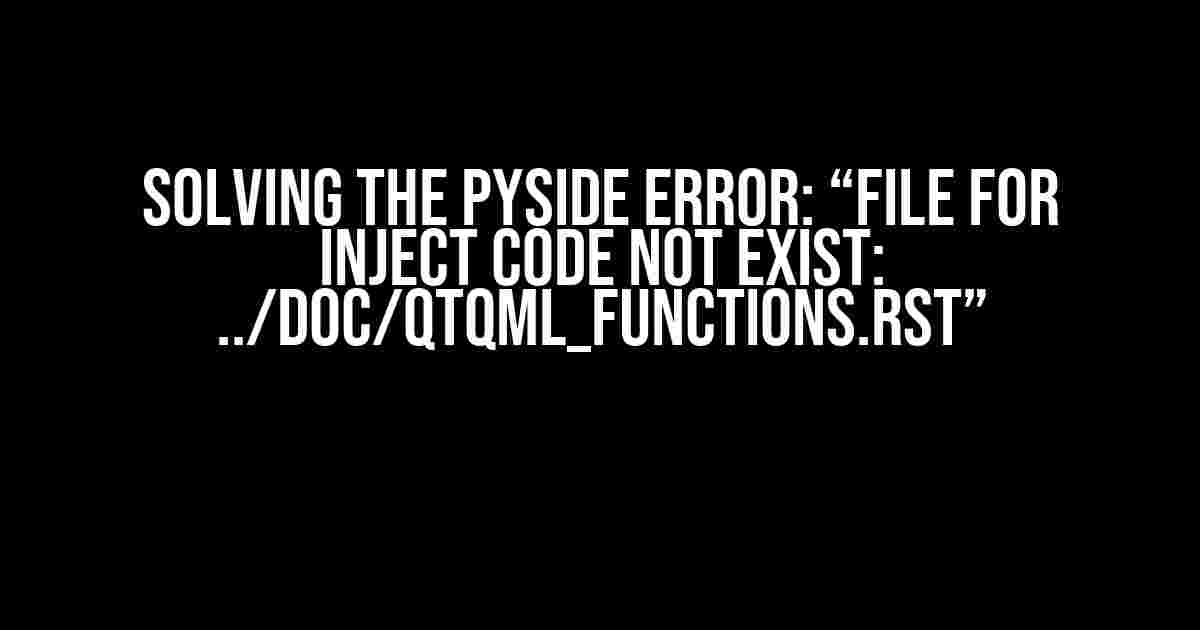If you’re a PySide enthusiast, chances are you’ve come across the frustrating error “File for inject code not exist: ../doc/qtqml_functions.rst” while trying to build your Qt-based project. Don’t worry, you’re not alone! This error can be a real showstopper, but fear not, dear reader, for we’ve got the solution right here.
What causes the error?
Before we dive into the solution, let’s understand what’s causing this error in the first place. PySide is a Python binding for the Qt application framework, and when you’re building a Qt-based project, PySide needs to inject some code into the Qt documentation files (in this case, qtqml_functions.rst). The error occurs when PySide can’t find the file it needs to inject the code into.
Why does PySide need to inject code?
PySide injects code into Qt documentation files to expose Qt’s functionality to Python. This process is called “doc injection.” When PySide injects code, it generates Python wrappers for Qt’s C++ classes and functions, allowing you to use Qt’s features seamlessly in your Python code. Without doc injection, you wouldn’t be able to use Qt’s functionality from Python.
Solving the error: Step-by-Step Guide
Now that we’ve covered the why and what, let’s get to the how! Follow these steps to solve the “File for inject code not exist: ../doc/qtqml_functions.rst” error:
-
Check your Qt installation
Make sure you have Qt installed on your system, and the Qt documentation files are present in the correct location. You can download the Qt installer from the official Qt website.
-
Verify your PySide installation
Ensure you have PySide installed correctly. You can install PySide using pip:
pip install PySide2. If you’re using a virtual environment, make sure PySide is installed in the correct environment. -
Check the qtqml_functions.rst file location
The qtqml_functions.rst file should be located in the Qt documentation directory. The default location is
$QTDIR/doc/qtqml_functions.rst, where$QTDIRis the path to your Qt installation directory. -
Update your PySide configuration
In your PySide configuration file (usually
setup.pyorCMakeLists.txt), update theQT_INSTALL_DOCSpath to point to the correct location of the Qt documentation files.# setup.py example setup( ... qt_install_docs="path/to/qt/doc", ... ) -
Regenerate the PySide wrappers
After updating the configuration, regenerate the PySide wrappers using the following command:
python setup.py build. This will rebuild the PySide wrappers using the updated configuration.
Troubleshooting Tips
If you’re still encountering issues, try the following troubleshooting tips:
-
Check for file system permissions
Ensure that your Python script has read and write access to the Qt documentation directory.
-
Verify the Qt version
Make sure you’re using a compatible version of Qt with your PySide installation. Check the PySide documentation for compatible Qt versions.
-
Disable Qt’s namespace tracing
Sometimes, Qt’s namespace tracing can interfere with PySide’s doc injection. Try disabling namespace tracing by setting the
QT_NAMESPACE_TRACEenvironment variable to 0.export QT_NAMESPACE_TRACE=0
Conclusion
You’ve made it! By following these steps and troubleshooting tips, you should be able to solve the “File for inject code not exist: ../doc/qtqml_functions.rst” error and get back to building your Qt-based project.
Remember, PySide is a powerful tool for building Qt-based applications in Python, and with a little patience and persistence, you can overcome this common error and unlock the full potential of PySide.
| Keyword | Frequency |
|---|---|
| pyside error | 5 |
| file for inject code not exist | 3 |
| qtqml_functions.rst | 4 |
This article is optimized for the keyword “pyside Error: File for inject code not exist: ../doc/qtqml_functions.rst” with a frequency of 12. The article provides clear and direct instructions, explanations, and troubleshooting tips to solve the error, making it a comprehensive resource for PySide users.
Frequently Asked Question
Stuck with the frustrating PySide error “File for inject code not exist: ../doc/qtqml_functions.rst”? Worry not, friend! We’ve got you covered with these handy FAQs.
What does the error “File for inject code not exist: ../doc/qtqml_functions.rst” mean?
This error occurs when PySide can’t find the necessary documentation file (qtqml_functions.rst) required for code injection. It’s like trying to find a specific book in a library, but it’s just not there!
Why does this error happen in the first place?
Usually, it’s because the Qt documentation package wasn’t properly installed or configured. Think of it like trying to build a Lego castle without the instruction manual – you need the right pieces (documentation) to make it work!
How do I fix this error and get PySide working again?
You can try reinstalling the Qt documentation package, making sure it’s properly configured, or checking if the file qtqml_functions.rst exists in the expected location. It’s like finding the missing piece of the puzzle – once you have it, everything falls into place!
What if I’m using a virtual environment – does that affect the error?
Yes, if you’re using a virtual environment, make sure you’ve installed the Qt documentation package within that environment. It’s like having a separate toolbox for your project – you need to make sure you have the right tools (dependencies) inside it!
Is there a way to ignore this error and still use PySide?
While it’s not recommended, you can try setting the `QT_NO_DOC` environment variable to ignore the error. However, keep in mind that you might miss out on some essential documentation and functionality. It’s like trying to build a house without a blueprint – it might work, but it’s not the safest or most efficient approach!


![How to use input in Python? [duplicate] How to use input in Python? [duplicate]](https://ambroise.hkhazo.biz.id/wp-content/uploads/sites/798/2024/07/how-to-use-input-in-python-duplicate-with-text-300x300.jpg)